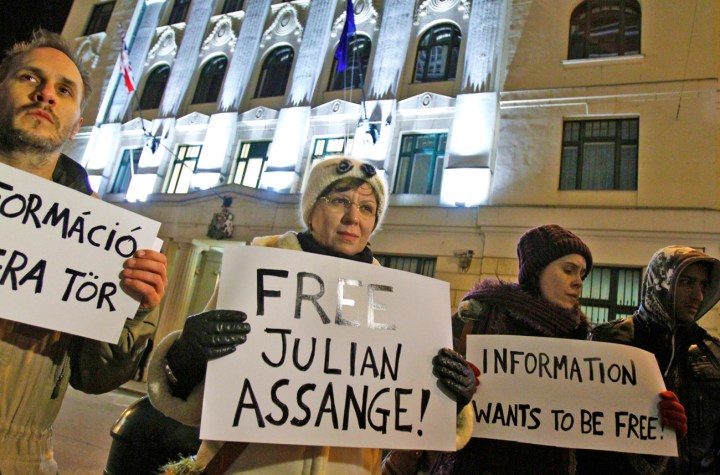Business Maverick, Media, Politics, Sci-Tech
The WikiLeaks effect – an end to free speech that radically offends?

People mistakenly think of the Internet as a public space where humanity’s voice is heard and it enjoys freedom of speech. That’s not the case says Harvard fellow Ethan Zuckerman, who believes WikiLeaks shows freedom of speech has its limits for commercial players that enable the web. By MANDY DE WAAL.
As a cyber war intensifies to punish commercial players who bowed to US political pressure and pulled the plug on WikiLeaks, Ethan Zuckerman, Internet researcher at the Berkman Center for Internet and Society, said commercial entities denying services to the controversial whistle-blowing site were changing Internet rules by interfering with freedom of speech.
“I have complicated feelings on WikiLeaks – as I am sure many people do. I am not entirely sure what the motives are associated with releasing this large trove of documents that has been very different from exposing a government programme or particular wrongdoing. It seems like a very targeted release. That said what most interests me regarding the WikiLeaks situation is the reaction of US and other governments, and particularly the private sector where there has been a very strong reaction to force WikiLeaks offline,” says Zuckerman. “I think that’s a very dangerous situation and potentially has a chilling effect on free speech.”
The co-founder of Global Voices Online, Zuckerman sits on the boards of Kenyan crisis crowdsourcing phenomenon Ushahidi, Ghana’s PenPlusBytes, as well as the US programmes board of the Open Society Institute. What disturbs Zuckerman is the way key Internet players, starting with Amazon and including EveryDNS, PayPal and MasterCard, lined up under government pressure to stop providing services to WikiLeaks. “I find that a very disturbing and worrisome situation. These companies are legally able to do this, but what this is really doing is calling into question whether controversial speakers will stay online. What this says is that if you are sufficiently controversial and if you anger a government or anger powerful individuals, this will result in a denial of service attack.”
Zuckerman says the WikiLeaks effect shows Internet service providers will deny controversial speakers a service and seek to limit their freedom of speech meaning people are living in a very different world to the one they had been living in previously. “It is a worrisome situation because it suggests that for unpopular and controversial speech it may be difficult or very expensive to remain able to speak.”
Humanity has largely thought of the Internet as a public space where anyone had the ability to stand up and say what they wanted to say. “What the WikiLeaks case is telling us is that we may treat the Internet as a public space, but that it is held by private players and these players may make the decision to constrain speech based on business criteria. This is the decision that has been made in this instance.” Zuckerman believes that what is required is a serious conversation and contemplation about the idea of having public conversations on private platforms. He says that if Internet service providers are going to be rendered harmless from liability as they are in terms of US law, they are going to have to speak out in a much more aggressive way against those political forces that would require them to censor controversial players in the digital sphere.
Zuckerman says he shares the view of his friend, Micah Sifry, founder of the Personal Democracy Forum, who is not pro-WikiLeaks, but definitely “anti anti-WikiLeaks”. Zuckerman adds that there is a partisan divide in the US media and that the response to Julian Assange and the organisation he represents is politically divided. “In more conservative circles we are seeing rhetoric about WikiLeaks that is unacceptable. Rhetoric calling for Assange’s assassination is absurd and shocking and frankly shouldn’t be tolerated. But there are also folks on the left who are not taking concerns about WikiLeaks seriously enough. Is there a coherent agenda, a coherent idea behind the leaking of all these documents? Is WikiLeaks trying to make a specific political point as it did with the collateral murder video or have they moved into an area where they are basically just against secrets as a whole? I think that second stance is a much more difficult one to justify philosophically.”
Zuckerman thinks it is very hard to make the case that government shouldn’t have any secrets and that diplomacy should be conducted entirely in public. “Asking for that level of radical transparency where every aspect of a government’s deliberation is public from the outset to me seems unrealistic and potentially a little dangerous. I don’t see that as a coherent philosophical agenda – essentially demanding that all the conversations between the state department and ambassadors be public, that doesn’t seem like a reasonable request to me.” Ironically what the cable dump will result in is more secrecy and Zuckerman says this will move sensitive dialogue offline in an effort to make classified information much harder to leak.
“The concept of leaking information is just a product of the digital age and a product of a certain culture of secrecy. There is good evidence that the secrets that are being released were accessible to about 3 million Americans. That’s an awful lot of people and it does call into question what is a secret in a digital age. It raises the question that leaking a quarter of a million diplomatic cables is something you couldn’t have done in the era before digital media. Having the ability to dump these out of a data base and put them onto a USB drive is a very important factor in all of this. You start putting those things together and I think you can make an argument that the landscape has basically shifted. It is just harder to keep things secret anymore once you have digitised them and made them accessible to a large number of people. The assumption may be that something that is digitised and accessible to that large number of people won’t be considered secret in the way it has been previously.”
WikiLeaks should teach governments that once information is digitised and people have access to it, it is very hard to control the spread of that information. “Governments should then be thinking of possibly being smarter about what they want to protect and what they are willing to disseminate. I think that there is an argument to be made that once the information is digitised it is going to be spread unless you take extraordinary means to prevent its spread. I think it is possible that you will see governments get smarter about things like watermarking and I think in the future, whether it is 3 million people who have access to the documents, there will be a digital watermark on the documents showing who accessed it so that released information gets traced back to the individual who leaked it and there is a clearer path to prosecution.”
Paradoxically the WikiLeaks effect may just be more government secrecy and a limiting of web freedoms by those private enterprises seeking to achieve immunity from political wrath. The former is largely beyond our control, but the latter certainly isn’t. Champions for freedom of speech need to be heard and must let those commercial entities who would seek to silence uncomfortable conversations online that their actions are at best questionable, if not reprehensible. DM
Read more: WikiLeaks cyberwar on Visa and MasterCard disrupts Christmas shopping in Operation Payback in the Telegraph, The 24-hour Athenian democracy in The Economist, WikiLeaks: Who are the hackers behind Operation Payback? in The Guardian, Hackers Give Web Companies a Test of Free Speech in the New York Times, WikiLeaks: Twitter explains why it’s not trending, as hackers play cat and mouse in Guardian Tech Blog.
Photo: Protesters hold banners in support of WikiLeaks founder Julian Assange during a demonstration in front of the British Embassy in Budapest December 9, 2010. The sexual misconduct case against Assange is a personal matter and not connected with his work releasing secret U.S. diplomatic cables, a Swedish prosecutor said on Tuesday. Assange, whose WikiLeaks website is at the centre of a furious row over the release of secret U.S. diplomatic cables, was arrested under a European Arrest Warrant on Tuesday after handing himself in to London police. REUTERS/Bernadett Szabo


















 Become an Insider
Become an Insider